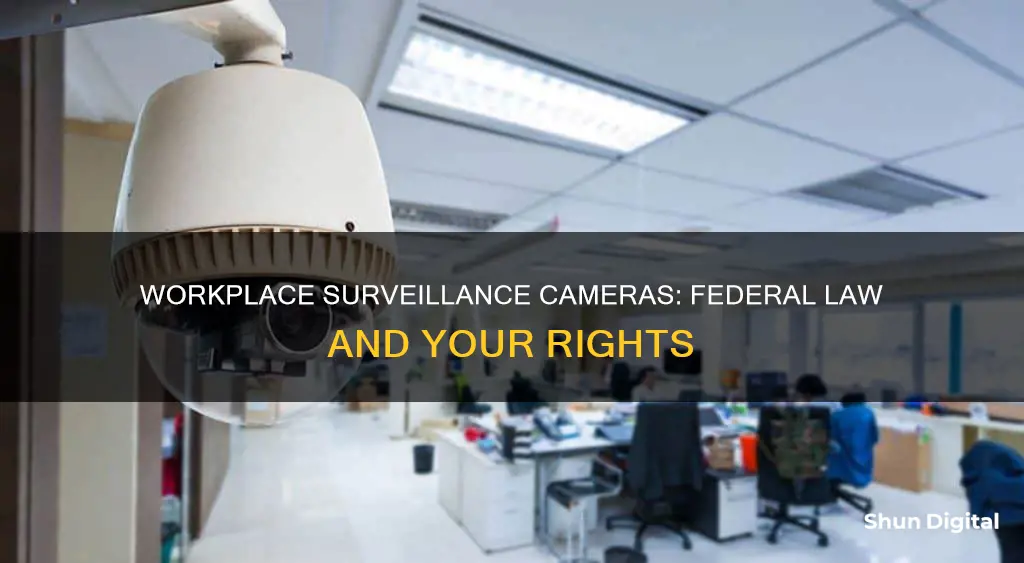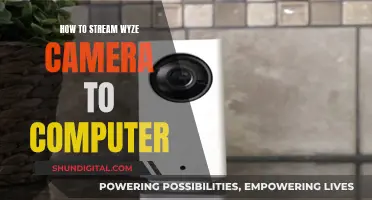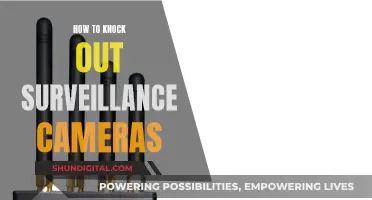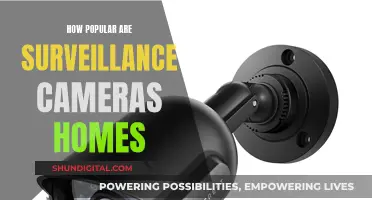
Workplace surveillance is a common practice, with more than half of employers surveyed by the American Management Association already using video monitoring. While there is no federal law that specifically addresses the use of surveillance cameras in the workplace, there are a few federal laws that are relevant. For example, federal wiretap laws prohibit employers from monitoring or recording certain employee communications, which may restrict the use of audio in video cameras. Additionally, the National Labor Relations Act (NLRA) prohibits employers from using surveillance cameras to monitor union meetings or activities. Beyond these considerations, the legality of workplace surveillance falls to state-level laws, which vary across the US.
| Characteristics | Values |
|---|---|
| Federal law on workplace surveillance cameras | No federal law prohibits the use of surveillance cameras in the workplace |
| Surveillance of union activity | Prohibited under the National Labor Relations Act (NLRA) |
| Surveillance in areas with an expectation of privacy | Prohibited in areas such as bathrooms, locker rooms, and break rooms |
| Notification to employees | Employers should notify employees about the use of surveillance cameras |
| Audio recordings | May be prohibited by federal wiretap laws and state wiretapping laws |
What You'll Learn

Legality of workplace surveillance cameras
In the United States, there is no federal law that specifically prohibits the use of surveillance cameras in the workplace. However, there are certain laws and considerations that businesses should be aware of when implementing surveillance systems.
Federal Laws
While there is no explicit federal law prohibiting workplace surveillance, there are a couple of federal laws that are relevant:
- Federal wiretap laws prohibit employers from monitoring or recording certain employee communications. This may restrict the use of audio recordings in video cameras.
- Section 7 of the National Labor Relations Act (NLRA) prohibits employers from using surveillance cameras to monitor union meetings or other union activities.
State Laws
The legality of workplace surveillance cameras varies from state to state. Some states have specific laws that address video surveillance in the workplace, while others do not. Here are some key considerations:
- Legitimate Business Reason: Employers must have a legitimate business reason for using video surveillance that outweighs the employee's privacy interest. Examples include security concerns, theft prevention, and improving productivity.
- Reasonable Expectation of Privacy: Video surveillance is not permitted in places where employees have a reasonable expectation of privacy, such as bathrooms, locker rooms, and personal offices. Break rooms, lounges, and other similar areas are also generally off-limits for surveillance cameras.
- Notification Requirements: Some states, such as Connecticut and Delaware, require employers to notify employees about the presence of surveillance cameras. This notification can be in the form of a memo, an employee handbook, or an employment contract.
- Audio Recordings: Most states have wiretapping laws that prohibit the recording of oral communications without the consent of at least one party. Employers should be cautious about using audio recordings in surveillance cameras to avoid violating these laws.
Best Practices
When implementing workplace surveillance cameras, businesses should follow these best practices:
- Avoid placing cameras in areas where employees have a reasonable expectation of privacy.
- Provide written notice to employees about the use and location of security cameras.
- Obtain consent from employees before recording audio, as federal wiretapping laws make this a risky area.
- Use security cameras as a safety tool to protect assets and employees, and follow legal and ethical guidelines.
Traveling with Camera Batteries: Flying the Friendly Skies
You may want to see also

Legitimate business reasons for surveillance
While there is no federal law that specifically addresses the use of surveillance cameras in the workplace, there are several legitimate business reasons for an employer to implement video surveillance.
- Security and Safety: Video surveillance can help protect employees and assets by deterring crimes such as vandalism, shoplifting, and theft. It also increases safety in parking lots and other areas where employees may be at risk.
- Injury Claims: Surveillance footage can provide valuable evidence when dealing with injury claims by customers or employees, helping to verify the validity of a claim and determine the cause of an incident.
- Employee Productivity and Efficiency: Surveillance can help improve employee productivity and efficiency, especially in retail and restaurant settings. It also frees up managers' time, allowing them to focus on critical tasks.
- Prevent Sexual Harassment: Surveillance cameras can act as a deterrent against sexual harassment in the workplace and provide evidence in court if any incidents occur.
- Resolve Disputes: Surveillance footage can provide proof to help resolve disputes between employees, managers, and business owners.
- Monitor High-Risk Areas: In certain industries, such as factories or businesses dealing with dangerous chemicals, surveillance cameras can monitor high-risk areas to ensure safety and reduce the risk of accidents.
- Theft Prevention: Surveillance can help prevent internal theft by employees and monitor money transaction points and retail shelves to deter shoplifting.
It is important to note that employers must balance these legitimate business reasons with employees' reasonable expectations of privacy. Surveillance is generally not permitted in areas such as bathrooms, locker rooms, and break rooms, where employees have a reasonable expectation of privacy. Additionally, employers should be transparent about the use of surveillance and obtain consent when required by state laws.
Dummy Battery Camera: What's the Deal?
You may want to see also

Employee privacy rights
Employees have a right to privacy in the workplace, and this right must be balanced with the interests of the employer. While there is no specific federal law on workplace surveillance cameras, there are some federal laws that are relevant.
Federal Laws
The Electronic Communications Privacy Act (1986) (ECPA) allows employers to monitor all employee verbal and written communication as long as there is a legitimate business reason for doing so. The ECPA also allows for additional monitoring if employees give consent. However, this consent provision can be tricky, as it might be inferred to allow monitoring of employees’ personal and business communications.
The Federal Wiretap Act prohibits the interception of stored voicemails and live telephone calls. However, employers may engage in the legal surveillance of oral telephone communications if they do so in the ordinary course of business.
Federal privacy laws give discretion to employers regarding how far they can go with employee monitoring programs. In some cases, employers don’t have to inform employees they’re being monitored. However, some regulations do require employee consent.
State Laws
State laws vary, but some have specific laws that address video surveillance in the workplace. For example, California, Connecticut, Delaware, and New York prohibit video or audio surveillance in certain workplace areas, such as restrooms or break rooms. Some states, like Connecticut and Delaware, require employers to notify employees if they are using any cameras in the workplace.
Employees have a reasonable expectation of privacy in certain areas of the workplace, such as bathrooms, locker rooms, and sometimes personal offices. Video surveillance is generally not permitted in these areas.
Employees also have a reasonable expectation of privacy regarding their personal communications. The ECPA makes it illegal to record conversations of workers without their consent. This means that without consent, office surveillance should be silent.
Employers must also protect sensitive employee information. They have the burden of protecting sensitive employee information, even if it comes from an employee’s personal browsing history or private data stored on a company computer.
In addition, employees have privacy rights when it comes to their personal use of company email systems. In some cases, employees may have a reasonable expectation of privacy even when using a company laptop to send and receive messages.
Overall, while employers have a lot of leeway when it comes to workplace surveillance, they must respect the privacy rights of their employees. This includes being transparent about any monitoring practices and only collecting the minimum amount of employee data necessary.
Wi-Fi Doorbell Cameras: Battery or Wired Power?
You may want to see also

Federal laws: ECPA and NLRA
While there is no federal law that specifically addresses the use of surveillance cameras in the workplace, the Electronic Communications Privacy Act (ECPA) and the National Labor Relations Act (NLRA) are two federal laws that are relevant to the topic.
The Electronic Communications Privacy Act (ECPA)
The ECPA is a federal law that safeguards email and phone conversations, as well as data stored electronically during communication, transit, and storage on computers. The law generally prohibits the interception and monitoring of oral, wire, and electronic communications unless certain conditions are met. These conditions include having a legitimate business purpose and obtaining the consent of at least one party involved in the communication. The ECPA also makes it illegal to record conversations of employees without their consent, which means that office surveillance cameras should not record audio.
The National Labor Relations Act (NLRA)
The NLRA protects the rights of employees to engage in union activities and improve their wages or other terms of employment. Under the NLRA, employers are prohibited from using workplace surveillance to interfere with, restrain, or intimidate employees who are exercising their rights. For example, setting up surveillance cameras to monitor union meetings or activities, or in break areas where employees may engage in protected activities, could violate the NLRA.
In summary, while there is no specific federal law on workplace surveillance cameras, the ECPA and NLRA provide important guidelines for employers. The ECPA focuses on protecting electronic communications and privacy, while the NLRA safeguards employees' rights to engage in union activities without interference from employers through the use of surveillance.
Princess Diana's Death: Were Surveillance Cameras Present?
You may want to see also

State laws on workplace surveillance
While there is no federal law that specifically addresses the use of surveillance cameras in the workplace, state laws vary on this issue. Here is an overview of state laws regarding workplace surveillance:
State-Specific Laws
- California, Connecticut, Delaware, and New York prohibit video or audio surveillance in certain areas, such as restrooms, break rooms, or locker rooms.
- Connecticut and Delaware require employers to notify employees about the presence of surveillance cameras, usually through advance written notice.
- Maine allows surveillance only if it is necessary for employee health, safety, or data security and requires notification to employees.
- Massachusetts mandates that cameras be documented and used only for legitimate business reasons, with proper signage and employee notification.
- Indiana permits surveillance in areas accessible only to employees, provided there is a notice about monitoring.
- Maryland prohibits the use of facial recognition cameras during job interviews without written consent.
- California's data privacy law, the California Consumer Privacy Act, is one of the first state laws to ensure people's right to online privacy, impacting businesses globally.
General Guidelines
- Most states allow employers to monitor employees' activities without consent if there is a legitimate business reason and no reasonable expectation of privacy.
- Employers must be cautious about invading employees' privacy rights, especially in areas like restrooms, locker rooms, and personal offices.
- Courts determine employees' privacy rights by weighing the employer's need to conduct surveillance against the employee's reasonable expectation of privacy.
- Federal wiretap laws prohibit employers from monitoring certain employee communications, restricting audio recordings in video surveillance.
- Section 7 of the National Labor Relations Act (NLRA) prohibits employers from using surveillance to monitor union activities.
- State labor departments and employment law attorneys can provide specific information about workplace surveillance laws in each state.
Sony HDR-CX405: Exploring the Shooting Modes
You may want to see also
Frequently asked questions
No federal or state law absolutely prohibits the use of surveillance cameras in the workplace. However, there are important limits on where employers can install cameras and the purposes for which they can use them.
Employers must have a legitimate business reason for using surveillance cameras to record employees. Surveillance is generally prohibited in areas where there is a reasonable expectation of privacy, such as bathrooms, locker rooms, and employee lounges.
Federal wiretap laws prohibit employers from monitoring or recording certain employee communications. This may restrict the use of audio in surveillance cameras. The National Labor Relations Act (NLRA) prohibits employers from using surveillance cameras to monitor union meetings or activities.







